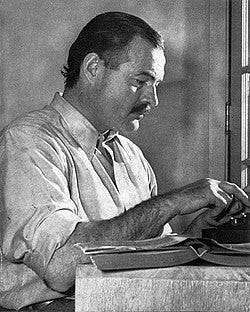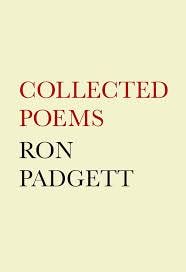As many recent law graduates start studying for the bar exam—and many current law students begin their summer jobs—we thought we’d put together some materials related to a drink that will likely be fueling their focus: coffee.
Enjoy!
—The Good Sentences Team
1. Essay: The Science of a Perfect Cup of Coffee by Ernesto Illy and Andrea Illy (2015)
Favorite Sentence: “The oil binds the particles together into a condensed maze of minuscule air passages.”
—Picked by Connor Bulka, Class of 2025 (Favorite Coffee Shop: Curious Coffee in Ann Arbor)
2. Fiction: A Clean Well-Lighted Place by Ernest Hemingway (1933)
Favorite Sentence: “In the day time the street was dusty; but at night the dew settled the dust and the old man liked to sit late because he was deaf and now at night it was quiet and he felt the difference.”
—Picked by John Angileri, Class of 2025 (Favorite Coffee Shop: Maplewood Coffee and Tea in Portland)
3. Poetry: The Morning Coffee by Ron Padgett (2013)
Favorite Lines:
“A cup of coffee whose first drink is too hot and whose last drink
is too cool, but whose many in-between drinks are, like Baby Bear’s por-
ridge, just right.”
—Picked by Sophia Guirguis, Class of 2025 (Favorite Coffee Shop: TeaHaus in Kerrytown)
Michigan Sentences: Here’s an article about an effort at the University of Michigan to use chats over coffee with random faculty members to foster productive new ideas and research projects.
Random Coffee Meet-ups Spur Innovation at U-M
Sample: “By creating opportunities for informal encounters with faculty outside their own fields, the program builds on the idea that such random pairings can not only create new connections, but also spark innovation and new research directions. The theory behind this practice is based on innovation as a social, not individual, phenomenon.
The approach was born of an experiment initiated by business professor Bill Lovejoy, when he emailed fellow U-M faculty he didn’t know and invited them out for coffee. ‘Why would a business school professor talk to a classics professor, or an economist speak to an art historian? Because that is how innovation really happens,’ Lovejoy said. ‘If everyone at the University of Michigan had a random coffee once a month, within a year we’d have a more innovative organization.’”
Syllabus Sentences: Coffee is a common ingredient in the routines of many writers. Here is a part of a chapter I give students interested in some other compositional routines.
“Habits and Habitats” (Chapter 2 of Editing and Advocacy)
Sample:
Constitutional Law Professor Cass Sunstein: “Most days I’ll mostly write from 9:30 until noon. There’ll be stops and starts, and I’ll typically go from one project to another, depending on how they’re going. At the moment I’m working on an article in the general area of behavioral economics and public policy. I’m also working on a magazine piece, on a very different issue. I like to go back and forth—if I’m stuck on one, I’ll jump to the other. I’m also working on my next book, which has nothing to do with my current one. I’ll turn to that if I feel something’s brewing there. Most mornings I’ll spend time on two or three different writing projects.”
Astrophysicist Sandra Faber: “It’s always been very, very important to me to have a balance between family and work. And I actually think that my work has been helped, especially in those early years, by having to tear myself away and do something different for some hours a day. I actually don’t have that as much now, and I think I’m overall not as efficient per unit of time; I get more done now because I have more hours, but I don’t think I’m as efficient as I was back then. So we had a daily routine. I do best when I divide my attention and spend some hours focusing on one thing and then switching attention and doing something different.”
Book Recommendations
For good sentences about coffee, civil war, and caffeine-filled resilience
The Monk of Mokha by Dave Eggers (2018)
Sample: “He had had a dream, and dreams are heavy things, requiring constant care and pruning.”
For good sentences about the role that places like coffee shops—or what used to be known as “coffeehouses”—play in fostering innovation
Where Good Ideas Come From by Steven Johnson (2010)
Sample: “The eighteenth-century English coffeehouse fertilized countless Enlightenment-era innovations—everything from the science of electricity, to the insurance industry, to democracy itself.”
For good sentences by the founder of Starbucks
Onward by Howard Schultz (2007)
Sample: “Whenever I see someone carrying a cup of coffee from a Starbucks competitor, whether it’s an independent coffee shop or a fast-food chain, I take their decision not to come to Starbucks personally. I wonder what I, as Starbucks’ chairman and CEO, might have done to keep them away and what I might do to encourage them to come back or to try us for the first time.”
Quick Tip
Here’s a quick tip about a cognitive trap that even the most powerful cup of coffee might not be able to fix: “attention residue.”








![The Monk of Mokha [Book] The Monk of Mokha [Book]](https://substackcdn.com/image/fetch/w_1456,c_limit,f_auto,q_auto:good,fl_progressive:steep/https%3A%2F%2Fsubstack-post-media.s3.amazonaws.com%2Fpublic%2Fimages%2F8f265dc9-7243-4f09-8e17-b764253f436a_1669x2560.jpeg)
![Where Good Ideas Come from: The Natural History of Innovation [Book] Where Good Ideas Come from: The Natural History of Innovation [Book]](https://substackcdn.com/image/fetch/w_1456,c_limit,f_auto,q_auto:good,fl_progressive:steep/https%3A%2F%2Fsubstack-post-media.s3.amazonaws.com%2Fpublic%2Fimages%2Fe04835d3-1fa1-4c6d-98ee-dd93c3d14669_795x1200.jpeg)
![Onward: How Starbucks Fought for Its Life Without Losing Its Soul [Book] Onward: How Starbucks Fought for Its Life Without Losing Its Soul [Book]](https://substackcdn.com/image/fetch/w_1456,c_limit,f_auto,q_auto:good,fl_progressive:steep/https%3A%2F%2Fsubstack-post-media.s3.amazonaws.com%2Fpublic%2Fimages%2F995f446f-7ed5-4100-9a2d-5241af4e21bd_1650x2531.jpeg)

I enjoyed the essay, poem, an article and sentences from good fiction on coffee, a beverage that brightens my mornings; and I've learned and enjoyed good constructive sentences.